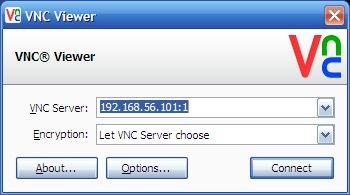1. 介绍
本文主要介绍了VNC Server的配置和使用
2. 安装
CentOS中默认就有安装VNC,可以通过命令rpm查看
[Jerry@localhost ~]$ rpm -qa | grep vnc vnc-4.1.2-14.el5_6.6 vnc-server-4.1.2-14.el5_6.6
或者通过yum命令查看
[Jerry@localhost ~]$ yum list | grep vnc vnc.i386 4.1.2-14.el5_6.6 installed vnc-server.i386 4.1.2-14.el5_6.6 installed
如果系统中没有安装VNC,可以通过下面的命令来安装
[root@localhost Jerry]# yum install vnc vnc-server
至于VNC的源码安装方法,这里就不介绍了,因为它的源码好像还不是那么好找
2. 配置
首先我们来了解一下VNC Server的运作过程
一般在装有VNC Server的系统中就有如下文件
/etc/sysconfig/vncservers : VNC Server总配置文件 /etc/init.d/vncserver : VNC Server启动脚本 /usr/bin/Xvnc : VNC Server主程序文件 /usr/bin/vncviewer : VNC View主程序文件 /usr/bin/vncserver : VNC Server运行perl脚本, 实际调用Xvnc
其中init.d目录下的文件不用说,可以进行如下操作
service vncserver start|stop|restart|condrestart|status
2.1 配置文件
首先我们修改配置/etc/sysconfig/vncservers
[Jerry@localhost ~]$ cat /etc/sysconfig/vncservers # The VNCSERVERS variable is a list of display:user pairs. # # Uncomment the lines below to start a VNC server on display :2 # as my 'myusername' (adjust this to your own). You will also # need to set a VNC password; run 'man vncpasswd' to see how # to do that. # # DO NOT RUN THIS SERVICE if your local area network is # untrusted! For a secure way of using VNC, see # <URL:http://www.uk.research.att.com/archive/vnc/sshvnc.html>. # Use "-nolisten tcp" to prevent X connections to your VNC server via TCP. # Use "-nohttpd" to prevent web-based VNC clients connecting. # Use "-localhost" to prevent remote VNC clients connecting except when # doing so through a secure tunnel. See the "-via" option in the # `man vncviewer' manual page. VNCSERVERS="1:Jerry" VNCSERVERARGS[1]="-geometry 800x600 -nolisten tcp -nohttpd -localhost" [Jerry@localhost ~]$
在这里的意思是对用户Jerry开启了VNC Server功能,并绑定至1号窗口,而VNCSERVERARGS则是启动参数。
2.2 相关设置
使用Jerry用户登录系统,设置密码(此步可跳过)并运行vncserver
[Jerry@localhost ~]$ vncpasswd Password: Verify: [Jerry@localhost ~]$ [Jerry@localhost ~]$ vncserver New 'localhost:1 (Jerry)' desktop is localhost:1 Creating default startup script /home/Jerry/.vnc/xstartup Starting applications specified in /home/Jerry/.vnc/xstartup Log file is /home/Jerry/.vnc/localhost:1.log [Jerry@localhost ~]$
这时在Jerry用户主目录下就生成了.vnc目录,在.vnc目录下同时生成了passwd xstartup文件
其中xstartup文件默认如下
[Jerry@localhost ~]$ cat .vnc/xstartup #!/bin/sh # Uncomment the following two lines for normal desktop: # unset SESSION_MANAGER # exec /etc/X11/xinit/xinitrc [ -x /etc/vnc/xstartup ] && exec /etc/vnc/xstartup [ -r $HOME/.Xresources ] && xrdb $HOME/.Xresources xsetroot -solid grey vncconfig -iconic & xterm -geometry 80x24+10+10 -ls -title "$VNCDESKTOP Desktop" & twm & [Jerry@localhost ~]$
我们将其修改为
[Jerry@localhost ~]$ cat .vnc/xstartup #!/bin/sh # Uncomment the following two lines for normal desktop: unset SESSION_MANAGER exec/etc/X11/xinit/
xinitrc [ -x /etc/vnc/xstartup ] && exec /etc/vnc/xstartup [ -r $HOME/.Xresources ] && xrdb $HOME/.Xresources xsetroot -solid grey vncconfig -iconic & xterm -geometry 80x24+10+10 -ls -title "$VNCDESKTOP Desktop" & gnome-session &
#twm
&
# if Desktop is KDE ,uncomment below line, comment line "gnome-session $" #startkde & [Jerry@localhost ~]$
然后我们再把vncserver关闭,其中1表示1号窗口
[Jerry@localhost ~]$ vncserver -kill :1 Killing Xvnc process ID 27691 [Jerry@localhost ~]$
2.3 防火墙配置
我们可以选择关闭防火墙或让VNC Server端口开启
首先关闭防火墙
[root@localhost Jerry]# service iptables stop
随后修改iptables配置,即文件/etc/sysconfig/iptables,打开该文件并找到如下地方
-A RH-Firewall-1-INPUT -j REJECT --reject-with icmp-host-prohibited
然后在这一行上面加入下面一行
-A RH-Firewall-1-INPUT -m state --state NEW -m
tcp
-ptcp
--dport5900:5903
-j ACCEPT
然后重新启动防火墙
[root@localhost Jerry]# service iptables restart
TIPS:
关于VNC端口
VNC给浏览器的端口是5800+N,给vncviewer的端口是5900+N,N是绑定的窗口好
如果想修改默认端口号,可修改脚本/usr/bin/vncserver[root@localhost Jerry]# netstat -tulp | grep vnc
tcp 0 0 *:5801 *:* LISTEN 28285/Xvnc
tcp 0 0 *:5901 *:* LISTEN 28285/Xvnc
tcp 0 0 *:6001 *:* LISTEN 28285/Xvnc
tcp 0 0 *:6001 *:* LISTEN 28285/Xvnc
2.4 开机自启
然后我们可以在启动的时候就让其运行
[root@localhost bin]# chkconfig --level 3 vncserver on [root@localhost bin]# chkconfig --level 5 vncserver on
4. 使用
我们就可以在Windows上使用VNC-Viewer来进行远程连接

其中VCN Server处也可以为192.168.56.101:5901
其中192.168.56.101为VNC Server服务器地址,1为绑定的窗口号
5. 遗留
笔者在实际使用的过程中发现,若是通过开机启动就让VNC Server运行,Viewer根本无法连接
然而,若是用户Jerry直接在命令行下执行vncserver,Viewer倒是可以正常连接
参考:
<RedHat下详细配置VNC>
<CentOS 7启动VNC Server失败解决办法>
<怎样在 CentOS 7.0 上安装和配置 VNC 服务器>